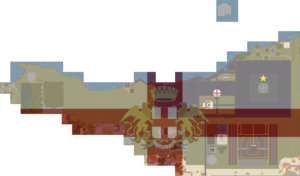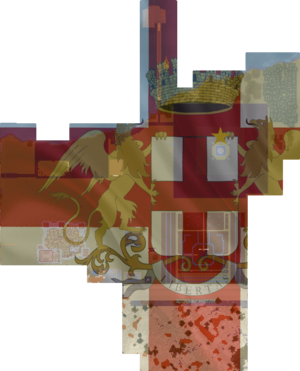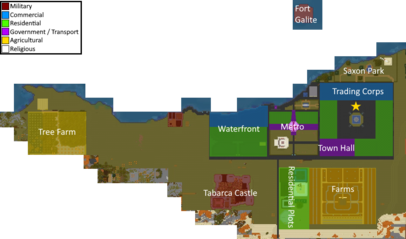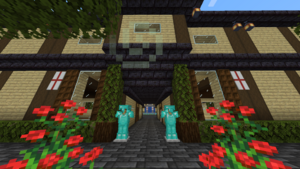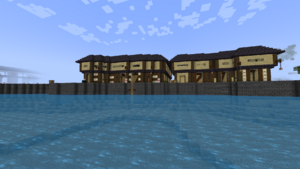Tabarca
Tabarca is a Genoese City situated in North Africa.
| ||||||||||||||||||||||||||||||||||
History
The Founding
Tabarca was founded on the 10th of August, 2022, and marked the start of Genoa's expansion into North Africa. In the early days, the town slowly expanded towards the border with Carthage. To its West as also the town of Annaba, of a nation of the same name. This saw the young town expand out into the desert early on, thanks to funding from the Genoese Government.
Overclaim Preparation
With the announcement of overclaim and the later introduction of a refund period for unclaiming land, Genoese territories began to be reorganised. While the bulk of this happened in Italy, where the bulk of Genoese possessions were, there was also some reorganisation of North African Territories. The town of Annaba had been purchased by Genoa from its founders and was being held by Senator PawluC di Medici. During this time period too, the town of Carthage, which was also the capital of the nation of Carthage, decided to join Genoa.
Border Reorganisation
With Carthage's entry into Genoa, a chunk exchange took place which saw the border between the two turned into a straight line, with Tabarca claiming slightly more chunks from Carthage than Carthage did from Tabarca. This chunk exchange also allowed the final completion of the initially planned town square, which had to be slightly reshaped due to initial claim restrictions. The border that came about as a result of the chunk swap is still in place to this day
To reduce the number of empty and unnecessary chunks held by the town, the decision was made to unclaim all of the empty desert that had been early claimed by the town. This increased number of available chunks, however, also enabled the expansion of the town in new areas. Additionally, the bridge to Fort Galite was destroyed and the land the bridge once occupied unclaimed.
Annexation of Annaba
Alongside the decision to re-organise South Italy, the Genoese government decided to have Tabarca annex the Eastern portion of Annaba. Over a period of two days, Annaba was slowly unclaimed and the gold transferred to Tabarca to allow claiming to take place. Not all of Annaba was claimed, with the remaining Western portions that were unclaimed eventually being taken by the Papal town of Constantine. The exact claims were tweaked with slightly in an attempt to optimise the number of claims Tabarca held, with a handful of empty inland chunks being unclaimed shortly before the end of the refund period.
Location
Neighbours
To the east of the town lies Carthage, the former capital of the nation of Carthage, which predates Tabarca's founding. Thanks to the town being founded closely to the border, the town spawn and initial town buildings surrounding the town square lie close to or on the border.
To the west of the town lies the Papal town of Constantine, which controls Western portions of the old town Annaba.
The town itself sits on a moulded plain before rising into the desert that dominates much of North Africa. Along the coast, the town sits above sea level with deepslate sea walls protecting the coastline.
Land Use
Land in Tabarca is used for a variety of purposes and the town contains a number of public buildings, parks and homes for citizens to use and enjoy.
Residential
Residential Housing in Tabarca is located in two primary areas. An area of grassy land is set side along the Farms for residential plots which allow residents to build their own homes. Housing along the waterfront area, and further in land behind it provides the bulk of residential housing, with residential housing surrounding the Town Square being reserved for longer standing residents.
Military
There are a handful of military buildings in Tabarca. Most notable among them is Tabarca castle, a castle designed by Consul Erwinnn Doria during their tenure as Doge. Additionally, the old border between Tabarca and Annaba is marked by Annaba Tower, a reconstruction of an old fortification that existed in Annaba prior to its annexation. Finally, Galite island hosts a fortress that juts out into the Mediterranean Sea and is the Northernmost point of the town.
Commercial
The Tabarcan waterfront is home to several small stores that sell a small variety of essential items to residents. Additionally, Tabarca hosts the headquarters of a couple of organisations, the Tabarcan Sand Company and Tabarcan Brewing Company, that supply the Genoese national shop with sand products and Haste Potions respectively.
Agricultural
Behind the Town Centre are the public farms, which allow residents to farm Wheat, Carrots and Potatoes. Within the centre of the farms is a private farm, held by the Tabarcan government, with a windmill in the centre. Within the windmill produce gathered from the private farms is collected and is often sold for gold or turned into food which is provided to new residents free of charge.
The Tree farm is a privately held tree farm run by the Tabarcan government and provides wood to be given to new residents and to be used in building projects, as Tabarca is predominately built out of Dark Oak and Birch Wood.
Government / Transportation
Alongside managing military buildings, the government holds a few other buildings in the town. The Metro station provides transport links to the rest of Genoa via the Genoese iceroads. The small boat dock allows for easy access to the ocean for residents and visitors, but the town does also have a small number of access ladders dotted along the sea wall to allow relatively easy access to the town in the event someone falls off of the edge.
The Town hall is situated at the back of the Town Square, and on the bottom floor hosts a map of Tabarca, with an additional copy being in the metro station, and further along hosts pews and a speaking area for hosting speakers and events in Tabarca. Up a pair of spiral staircases is an elevator viewing area. It also contains a small number of books containing Genoese Treaties and information about House Fieschi, the governing house of Tabarca.
Religious
Tabarca hosts two religious buildings, a Shrine to Synargle, located along the waterfront just beyond Sion Park, and a Temple to the Sun God, located behind the metro.
The Synist Shrine is a small building that hosts a few pews and a small speaking area, and is the only known shrine dedicated to Synargle on Aurora.
The Temple to the Sun God is an open-air temple that hosts a large 3x3 fire pit, as well as elevated seating areas on 3 sides to allow worshippers to pray and sacrifice precious objects to the Sun God.
Points of Interest
Town Square
The town square hosts a fountain in the center, and is surrounded by buildings on all sides, with two archways allowing entry and exit. The buildings on the vertical rows host homes, some vacant and some occupied, as well as an enchantment room. All these buildings can be accessed from the town square or from its exterior. There are four larger buildings along the town square, all of which are accessible via doors in the archways.
Towards the coast, or "front", are the headquarters of two branches of the Genoese Trading Company, the Alchemy and Sand bureaus. In the tower above the pathway sits joint staffing quarters, with beds and some limited storage space.
The "back" of the town square hosts the town hall and the residence of the town's mayor. The town hall hosts a marked map of the town and a stage with seating for speeches to be made. The Mayor's residence is entirely private.
The Waterfront
Directly along the waterfront sits the town's shops, a small boats dock for easy access to the water and emergency access ladders in case someone falls off the unprotected coastline and into the water. These are dotted with relatively even spacing along the entire town's coastline.
The Town's shops sell a variety of items, with some government run shops providing basic goods to the town's population. These include the Tabarcan Restaurant, which sells Baked Potatoes and Bread, both from the town's farms, and cooked rabbit, which is obtained from local wildlife. The General Store sells relatively small quantities of starting resources, including several wood types and materials often sought out by new players. Empty shops can also be rented, or purchased, by Tabarcan residents and contain a range of space to sell goods, as well as storage on the second floor.
Behind the town's shops lies the waterfront housing, which while it does not have immediate access to the coastline, is backed onto the stores (with covered alleys separating the two). They provide homes to residence wishing to live in prebuilt homes.
The waterfront also hosts the town's aquarium, which is mostly underground but contains a squid, a pair of tropical fish, an axolotl, and a dolphin in the large, central tank.
Metro Station
The Metro Station sits in the centre of the developed core of Tabarca. It is connects Genoese North Africa to the rest of the Genoese Iceroad Network, and is the first or last stop in North Africa. Within the station complex is the station itself, which has water elevators to send travellers to and from ground level. It also has two larger houses along the front, that line the road opposite Sion Park and the Waterfront. At the back of the Station sits an empty patch of land that contains the Tabarcan Temple to the Sun God.
The Border Regions
The border with Carthage sees the town rise to reach the various levels that Carthage sits at, and with a chunk exchange that took place in November the claim border is now entirely straight, with the increase in height taking place in both town's claims.
The border with the Wilderness is much more varied, in part thanks to ongoing terraforming projects. Towards the town centre, the border with the desert follows a similar manner to that with Carthage, curving around the back of the farm and residential plots, before eventually becoming a sheer cliff-face as you get further from the town spawn.
